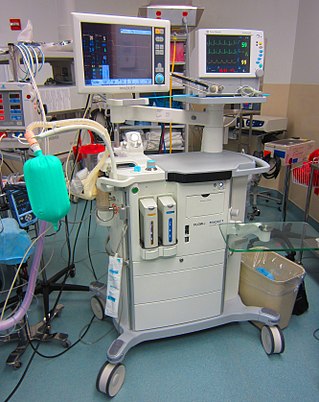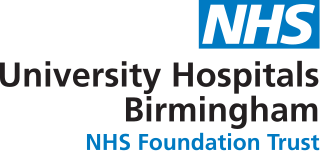Related Research Articles

Vital signs are a group of the four to six most crucial medical signs that indicate the status of the body's vital (life-sustaining) functions. These measurements are taken to help assess the general physical health of a person, give clues to possible diseases, and show progress toward recovery. The normal ranges for a person's vital signs vary with age, weight, sex, and overall health.
Cambridge University Hospitals NHS Foundation Trust is a British public sector healthcare provider located in Cambridge, England. It was established on 4 November 1992 as Addenbrooke's National Health Service Trust, and authorised as an NHS foundation trust under its current name on 1 July 2004.
A post-anesthesia care unit (PACU) and sometimes referred to as post-anesthesia recovery or PAR, or simply recovery, is a part of hospitals, ambulatory care centers, and other medical facilities. Patients who received general anesthesia, regional anesthesia, or local anesthesia are transferred from the operating room suites to the recovery area. The patients are monitored typically by anesthesiologists, nurse anesthetists, and other medical staff. Providers follow a standardized handoff to the medical PACU staff that includes, which medications were given in the operating room suites, how hemodynamics were during the procedures, and what is expected for their recovery. After initial assessment and stabilization, patients are monitored for any potential complications, until the patient is transferred back to their hospital rooms.

Hill-Rom Holdings, Inc., doing business as Hillrom, is an American medical technology provider that is a subsidiary of Baxter International.

The University Hospitals Birmingham NHS Foundation Trust provides adult district general hospital services for Birmingham as well as specialist treatments for the West Midlands.

Self-care has been defined as the process of establishing behaviors to ensure holistic well-being of oneself, to promote health, and actively manage illness when it occurs. Individuals engage in some form of self-care daily with food choices, exercise, sleep, and hygiene. Self-care is not only a solo activity, as the community—a group that supports the person performing self-care—overall plays a role in access to, implementation of, and success of self-care activities.

NHS Scotland, sometimes styled NHSScotland, is the publicly–funded healthcare system in Scotland and one of the four systems that make up the National Health Service in the United Kingdom. It operates 14 territorial NHS boards across Scotland, supported by seven special non-geographic health boards, and Public Health Scotland.
A virtual ward allows patients to get the care they need at home safely and conveniently, rather than being in hospital.
An outpatient department or outpatient clinic is the part of a hospital designed for the treatment of outpatients, people with health problems who visit the hospital for diagnosis or treatment, but do not at this time require a bed or to be admitted for overnight care. Modern outpatient departments offer a wide range of treatment services, diagnostic tests and minor surgical procedures.
The Healthcare Quality Improvement Partnership (HQIP) was established in April 2008 to promote improvement in health services, by increasing the impact that clinical audit has on healthcare quality in England and Wales and, in some cases other devolved nations. It is led by a consortium of the Academy of Medical Royal Colleges, Royal College of Nursing and National Voices.

Spire Healthcare Group plc is the second-largest provider of private healthcare in the United Kingdom. It is listed on the London Stock Exchange and is a constituent of the FTSE 250 Index.

Remote patient monitoring (RPM) is a technology to enable monitoring of patients outside of conventional clinical settings, such as in the home or in a remote area, which may increase access to care and decrease healthcare delivery costs. RPM involves the constant remote care of patients by their physicians, often to track physical symptoms, chronic conditions, or post-hospitalization rehab.
Telehomecare (THC) is a subfield within telehealth. It involves the delivery of healthcare services to patients at home through the use of telecommunications technologies, which enable the interaction of voice, video, and health-related data. The management of care is done from an external site by a healthcare professional.
Preventice, Inc., formerly known as Boost Information Systems, Inc., was founded in 2007 by Jonathan Otterstatter, Scott Burrichter, Greg Wobig, and Dan Spors. The company is headquartered in Rochester, Minnesota.
Huma is a British healthcare technology company based in London, UK. It produces applications that integrate health data from existing hospital databases as well as patient wearables and other mobile devices and securely transmits it for use by doctors.
Norfolk Community Health and Care NHS Trust is a provider of community services to a population of about 882,000 in Norfolk. It was established under the Transforming Community Services initiative. It comprises the community services previously run by Norfolk Primary Care Trust.
Healthcare in Leicestershire was the responsibility of three clinical commissioning groups covering West Leicestershire, Leicester City and East Leicestershire and Rutland until July 2022. As far as the NHS is concerned Rutland is generally treated as part of Leicestershire.
Manchester University NHS Foundation Trust is an NHS Acute Foundation Trust which operates 10 hospitals throughout Greater Manchester. It is the largest NHS trust in the United Kingdom, with an income of £2.2bn and 28,479 staff in 2021–2022.
Livi is a digital healthcare service by Kry International AB, a Swedish online healthcare company based in Stockholm. Kry International was established in 2015 and operates as Kry in Norway and Sweden. In France and the United Kingdom, it operates as Livi.

The United Kingdom's response to the COVID-19 pandemic consists of various measures by the healthcare community, the British and devolved governments, the military and the research sector.
References
- ↑ "How do you turn disappointment into something beautiful? The origin of Luscii". Luscii. Retrieved 29 July 2021.
- ↑ "FocusCura subsidiary Luscii will continue as independent company with partner OMRON Healthcare to accelerate their international expansion". Globe Newswire. 21 January 2019. Retrieved 29 July 2021.
- ↑ "Prix Galien Excellence Award". Medium. 20 May 2021. Retrieved 29 July 2021.
- ↑ "LUSCII SCHRAPT MERKNAAM IN TELEMONITORING-APP". ICT Health. 9 July 2021. Retrieved 29 July 2021.
- ↑ "OMRON Healthcare Acquires Luscii Healthtech to Advance and Innovate Remote Patient-monitoring Adoption at Scale". PR Newswire UK. Retrieved 2024-04-05.
- ↑ "Interview: How innovative technology is enabling COVID patients to recover at home". Building Better Healthcare. 16 June 2021. Retrieved 29 July 2021.
- ↑ "Imperial College launches AI-powered remote monitoring for heart failure". Digital Health. 22 June 2021. Retrieved 29 July 2021.
- ↑ "App set to help thousands of COPD patients across the district". Keighley News. 30 June 2021. Retrieved 29 July 2021.